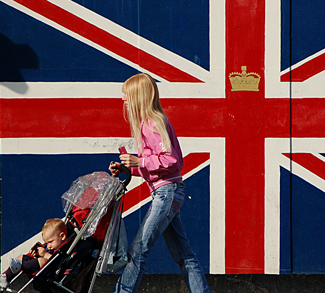The United Kingdom has been a fixture of European and global politics for several centuries and remains a key player. But after decades of decline the next few years seem certain to test the integrity of its political make-up as it faces the consequences of a long avoided question: What does Britain stand for in the twenty-first century?
As a state the UK is still a key global player diplomatically and militarily. It plays leading roles in the EU, UN, and Nato among other institutions. Even within these organizations it has retained its independence of action and the ability to surprise, such as when it recently applied to join China’s nascent Asian Infrastructure Investment Bank (AIIB). This caused a rare breach with its close ally the United States and prompted a flurry of applications from other European countries. But while the UK still commands attention abroad, at home there has long been a sense of malaise at the direction the country has taken.
Composed of at least four distinct ‘nationalities’ plus a multitude of regional, religious, and linguistic identities, the British state was always an awkward construct to have to manage as a political unit, even before it became the melting pot of migrants it is today. The territories that would eventually form the United Kingdom were originally only joined by their (frequently forced) allegiance to a thuggish series of tenuously interlinked royal dynasties. Some areas, such as the Scottish Highlands or the Border retained their separate status for centuries after their supposed integration into ‘England’ or ‘Scotland,’ never mind the idea of a United Kingdom. The largest two parts of the United Kingdom shared a king for over a century before two thrones became one. Britain today is still not a national federation along the lines of Australia or the United States. Political union through the ‘personal union’ of a divinely chosen monarch did not merge the inhabitants of the British Isles into a unified people.
Indeed the original reason behind the creation of the United Kingdom in the 18th century was a political project from the top. The new kingdom of Great Britain was intended as the central hub of a British Empire that included neighboring Ireland. Though Ireland was belatedly inducted into the UK in the early 19th century, the partition of that island between the heavily colonized north and the freer south showed how shallow and legalistic the idea of a centrally imposed ‘British’ identity could be. The Empire’s demise has since nullified the Union’s original purpose for the English and Scottish upper classes. Meanwhile the end of the industrialization that was associated with being British for many workers in the 19th and 20th centuries has left a big void of purpose at the heart of many UK communities around the country.
The story of the UK since the mid-twentieth century, and particularly since the end of the Cold War, has been the resurgence of local and national pride. The devolution of powers to Wales, Scotland, and Northern Ireland is one result. But even within England there has been a move away from the center. Cornwall in the south-west of England was granted the status of a protected national minority in 2014. Meanwhile the deindustrialized north of England has long resented the economic and cultural dominance of the capital and the feeling is often mutual. Now plans are afoot to try to create a northern counterbalance to London. The UK has long been considered unusual in lacking a second large city outside the capital that can generate substantial national economic activity. The sense of economic disadvantage stemming from geographic distance from London’s prosperous classes feeds wider discontent. As elsewhere in the digital world the periphery is in revolt against the center.
Britain’s national political parties have fallen victim to this trend. For much of the recent past their energy went in to political and social reform rather than questions of identity. In the last twenty years this has included a concerted effort to devolve power back down to a local level in a previously over-centralized state. But many of their arguments, such as their 2014 campaign in favor of Scotland remaining inside the UK, seem to boil down to an appeal to economic self-interest over personal conviction. Troublingly often British politicians have failed to make the case for a common British identity that adds up to more than numbers. Since the demise of industry and empire the UK has not sought a new national narrative such as America’s Manifest Destiny, Scandinavia’s collective promotion of peace and human rights or the republicanism of France’s slogan ‘liberté, égalité, fraternité.’ The result is anti-European and separatist sentiment has continued to spread through the British electorate, whose advocates sound passionate and have the appeal of novelty without responsibility.
Yet the British people actually share more in common than they may think at first. A recent DNA study of Britons has shown that genetically those of Celtic ancestry in Scotland and Cornwall were more similar to their English neighbors than they were to each other. Ancestry is no respecter of later political frontiers it seems. In Scotland today the case might be made against separation from the UK because of the infrastructure, economics and military consequences. I prefer to make it based on the narrative of a common past that saw a hodgepodge of unrelated groups of British ‘subjects’ successfully struggle to assert their rights against first the monarchy and then the upper classes of each era. From the Magna Carta to the suffragettes’ movement, it is these people who made Britain what it is today. Our notions of personal liberty, democracy, and human rights (however far we have sometimes strayed from them in practice) have been the UK’s most enduring and influential global export and continue to shape the modern world.
Many Britons’ sense of these shared cultural values has been strained by the huge disruptive effects of changes in technology, the labor market, and geopolitics that have occurred in just thirty-five years. Since the end of the post-war consensus in 1979, the UK has grown richer, yet more divided. It is more diverse and multi-ethnic, yet smaller and has a less important geopolitical role to play. The devolution of the UK has opened up the space for different expressions of modern Britishness to appear, and thus a gap in expectations of the Union to be exposed. What an Ulster Unionist voter in Belfast and a first generation immigrant in London think of as being ‘British’ is very different. To an SNP voter ‘British’ is often just code for ‘English.’ The idea of there being a British identity can seem like an ideological straitjacket that was invented, after the fact, to justify the creation of an artificial political union from a monarch’s personal estates.
I would turn that argument on its head and say that the very artificiality of an overarching British identity in an era of multiple overlapping loyalties is a good thing. Like these islands I am a patchwork of different peoples and places. For example I am the son of an English father and a Scottish mother, who was born in Aberdeen and grew up in the north-west of England. I went to study in Scotland for my university education and today work in London. The identity of being ‘British’ is broad and flexible enough combine all these parts of me and more. The civic nationalism of a British identity is less reductionist than the ethnic nationalism of an English, Scottish or Welsh nationalist. It includes those of us who don’t feel particularly ‘Welsh,’ ‘English,’ or ‘Scottish’ but who are still part of the population of these islands.
With a large first generation immigrant population and the next generation a diverse and heterodox group the time is right to make an argument that an open, post-imperial British identity is the only way the peoples of these islands will thrive in the 21st century. Separation, whether from Europe or each other, is in the end only political theater. It does not change the deeper issues facing us all about the future of work in an age of job-destroying smart information technology, or the fraying ties between British governments and their people, or more effective in tackling global problems like climate change, migration, terrorism, or transnational crime. If Britain were to shrink we would only all be diminished culturally and politically. A successful three hundred year old union deserves better treatment than that from its members.
The opinions, beliefs, and viewpoints expressed by the authors are theirs alone and don’t reflect any official position of Geopoliticalmonitor.com.




